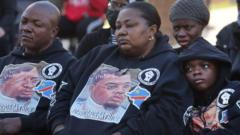Following the breakdown of a cease-fire, Hamas has renewed its rocket assaults on Israeli targets, particularly Tel Aviv, as Israeli ground operations intensify in Gaza. The political landscape is turbulent, with protests emerging in Israel and Prime Minister Netanyahu’s leadership facing critical scrutiny.
Tensions Escalate as Hamas Strikes Tel Aviv Amid Renewed Conflict

Tensions Escalate as Hamas Strikes Tel Aviv Amid Renewed Conflict
Hamas launches its first rocket attack in months, coinciding with Israel's expanded military operations in Gaza, reigniting fears of a full-scale war.
Hamas launched a series of rocket attacks on Tel Aviv yesterday, marking a significant escalation in the ongoing conflict as Israeli forces ramped up their ground operations in Gaza. This latest barrage comes on the heels of a two-month cease-fire that crumbled, leading to fears of a return to full-scale war in the region.
In response to the renewed fighting, Israeli Prime Minister Benjamin Netanyahu is expected to dismiss the head of Shin Bet, Israel's domestic intelligence service, amidst growing public protests. The situation is precarious; Netanyahu remains focused on securing the passage of a state budget, which requires the backing of right-wing legislators—many of whom favor escalating military engagement to counter Hamas.
Patrick Kingsley, Jerusalem bureau chief, provided a perspective on the deadlocked situation. He noted that both Israel and Hamas are entrenched in their respective positions: Israel demands the safe return of captured hostages while simultaneously seeking to dismantle Hamas militarily. However, Hamas is unwilling to release the hostages without guarantees for its survival, creating an impasse that leaves negotiations stagnant.
Public protests demanding a new truce to protect hostages have surged in Israel. Despite these calls, Netanyahu seems unfazed, prioritizing right-wing support over peace efforts.
Additionally, former President Trump's controversial proposal to expel the population of Gaza has been softened, with aides indicating it was meant as a provocative suggestion rather than an actionable plan. In the wake of the cease-fire's collapse, discussions led by Arab leaders, particularly Egypt, have emerged for a more neutral governance in postwar Gaza. However, these proposals received swift rejection from the Israeli government, which is resistant to any discussions surrounding Palestinian statehood.
With tensions running high and the situation rapidly evolving, the outlook remains grim as both sides brace for further confrontations in the days to come.




















